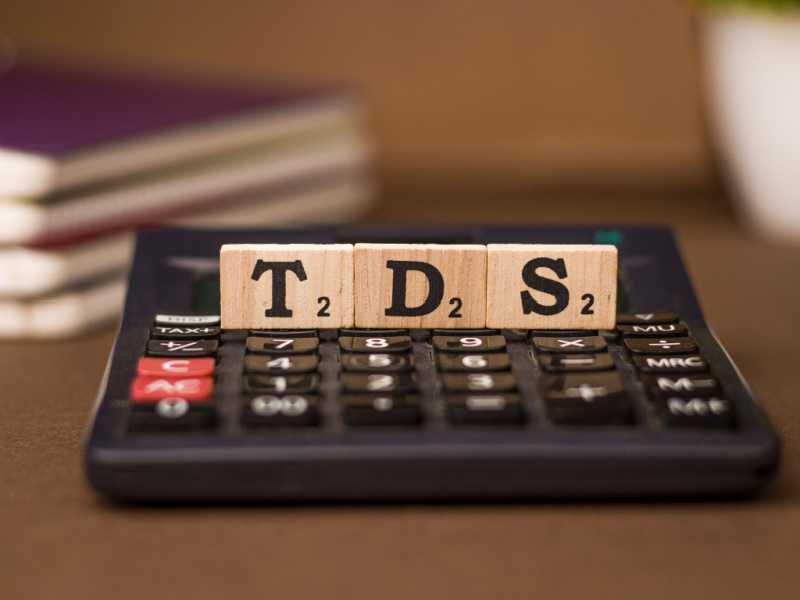
There is a fraction of taxpayers in the country but income tax is the lifeline for a developing nation. The revenue generated is used in building the nation through various infrastructure and social development projects. However, cases of tax evasion are rampant in the country, and to curb this, the government has structured the format to tax the income at its very source. This will not only reduce the cases of tax evasion but will also include more individuals under the ambit of taxation.
Given below is the meaning of TDS and its relevance in the Indian taxation system as well as the cases where TDS is applicable.
What is TDS?
TDS stands for Tax Deducted at the Source, which simply put, refers to the taxation on income at the point of its disbursal. Under these taxation rules, the Department has mandated that the taxpayers will receive the income after it is taxed at the specified rate as per the provisions of the Income Tax Act. The scope of TDS is under the purview of sections 192-194 of the Income Tax Act, 1961.
Read more: Tax deduction on mutual fund dividends
What are the mandatory cases where TDS is to be deducted?
Section 192 to section 194 specify the cases where TDS has to be deducted by an entity before making payment to another. These sections specify the limit if any, beyond which the applicability of TDS comes into effect as well as details of the person liable to deduct the TDS and the applicable rate at which TDS has to be deducted. Some of the mandatory cases where TDS has to be deducted are highlighted below.
| TDS Section | Nature of Payment | Payer (Deductor) | Payee (Deductee) | Rate of TDS | Exemption Limit (No TDS to be Deducted up to threshold limit mentioned) |
| Section 192 | TDS on Salary | Any Person | Employee (Resident or Non-Resident) | Applicable Income Tax Slab Rates | Basic GTI exemption limit of Rs. 2,50,000, Rs. 3,00,000 or Rs.5,00,000 as the case may be. |
| Section 192A | TDS on Premature Withdrawal from Provident Fund | Any Person | Employee | 10% | Amount is less than Rs.50000 |
| Section 193 | TDS on Interest on Securities and Debentures | Any Person | Any Resident Person | 10% | Up to Rs. 10,000 or Rs.5000 respectively in an FY for Individual/HUF |
| Section 194 | TDS on Dividends | Domestic Company | Resident Person | 10% | Rs.5000 in an FY (for Individual) |
| Section 194A | TDS on Interest (Other than Interest on Securities) | Any Person (Other than Individual/HUF not liable to tax audit in last PY) | Resident Person | 10% | Rs.10,000 (for payments made by banks, cooperative banks or on post office deposits) and up to Rs.5000 (for other cases). [In the case of a senior citizen, the limit of Rs 10,000 shall increase to Rs. 50,000 w.e.f. 1.4.2018] |
| Section 194B | TDS on Winnings from Lottery or Crossword Puzzles | Any Person | Any Person | 30% | Rs.10000 |
| Section 194BB | TDS on Winnings from Race Horses | Any Person | Any Person | 30% | Rs.10000 |
| Section 194C | TDS on Payment to Contractors | Any Person (Other than Individual/HUF not liable to tax audit in the last PY) | Any Resident Person | 1% (for Individual/HUF)2% (other person) | Rs.30000 for individual payment.Rs.100000 for the total amount during an FY |
| Section 194D | TDS on Insurance Commission | Insurance Company | Resident Agent | 5% (for Individual/HUF)10% (other person) | Rs.15000 during FY |
| Section 194DA | TDS on Payment in Respect of Life Insurance Policy | Any Person | Any Resident Person | 5% | Rs.100000 |
| Section 194EE | TDS on Payment for Deposit Under NSS | Any Person | Any Person | 10% | Rs.2500 |
| Section 194G | TDS on Commission on Sale of Lottery Tickets | Any Person | Any Person | 5% | Rs.15000 |
| Section 194H | TDS on Commission or Brokerage | Any Person (Other than Individual/HUF not liable to tax audit in last PY) | Any Resident Person | 5% | Rs.15000 |
| Section 194I | TDS on Rent | Any Person (Other than Individual/HUF not liable to tax audit in the last PY) | Any Resident Person | 2% (on rent paid for use of machinery, plant or equipment)10% (other cases) | Rs.240000 during the FY |
| Section 194IA | TDS on Payment on Transfer of Immovable Property (Not Being an Agricultural Land) | Any Person (Other than a person referred to in section-194LA) | Any Resident Person | 1% | Less than Rs.50,00,000 |
| Section 194J | TDS on Fees for Professional or Technical Services | Any Person (Other than Individual/HUF not liable to tax audit in the last PY) | Any Resident Person | 10% | Rs.30000 during FY (the separate limit for each kind of payment) |
| Section 194LA | TDS on Payment of Compensation on Acquisition of Certain Immovable Property | Any Person | Any Resident Person | 10% | 2,50,000 |
| Section 194LB | TDS on Income by way of Interest from Infrastructure Debt Fund | Infrastructure Debt Fund | NR or Foreign Company | 5% | No exemption limit |
| Section 194K | TDS on Income from mutual fund units | Mutual fund | Any person | 10% | Rs. 5,000 |
| Section 194O | TDS on payment by e-commerce operator to seller for sale of goods and services on the e-commerce platform | E-commerce platform | E-commerce particpant | 5% | Rs.5,00,000 |
| Section 194S | TDS on payment of transfer of virtual assets | Any person responsible for payment of consideration for transfer of virtual assets | Any resident | 1% | Rs. 50,000 in case payment made by a specified person,Rs, 10,000 in any other case |
What are the penalties for non-compliance with TDS provisions?
The applicability of the TDS is mandatory on all relevant occasions as per the provisions of the Income Tax Act. Some of the prime cases when penal provisions under TDS are applicable are,
- When the TDS is not deducted at the source of the income, Section 201A levies a penalty at the rate of 1% per month from the date on which the tax was to be deducted to the actual date of deduction
- When TDS is deducted but not paid or deposited with the government authority, Section 201A levies a penalty of 1.5% per month for non-payment of TDS from the date of deduction to the date of actual payment
- When the TDS returns are not duly filed, the defaulting party is liable to face a penalty of Rs. 200 per day of default under section 234E.
- When the entity provides incorrect information in the tax returns, the penalty under section 271H is levied from Rs. 10,000 up to Rs. 1,00,000
Conclusion
TDS provisions have been a part of the Indian taxation system for a long time and have ensured smooth revenue collection for the government over the years. The government from time to time introduces new sections that increase the purview of TDS applicability as well as modify or deletes obsolete TDS sections for the benefit of the taxpayers.
FAQs
Exemption for applicability of provisions of section 271H is,
-In case when TDS or TCS is paid or credited to the government,
-TDS or TCS file before the completion of one year from the due date specified.
-When the late filing fees and interest is paid to the credit of the government
When a person does not furnish their PAN number to the entity responsible for deducting TDS, the latter is entitled to deduct TDS at a higher rate up to a maximum of 20%.
Yes, when rent is paid against any land or building, TDS at the rate of 10% is to be deducted if the total rent amount for the financial year exceeds Rs. 2,40,000.
As per section 194K, if the dividend income from mutual funds is up to Rs. 5,000, the payer of such income is not liable to deduct TDS at the applicable rates. Hence, there will be no TDS on the dividend income of Rs. 3,000 received from mutual funds.


























